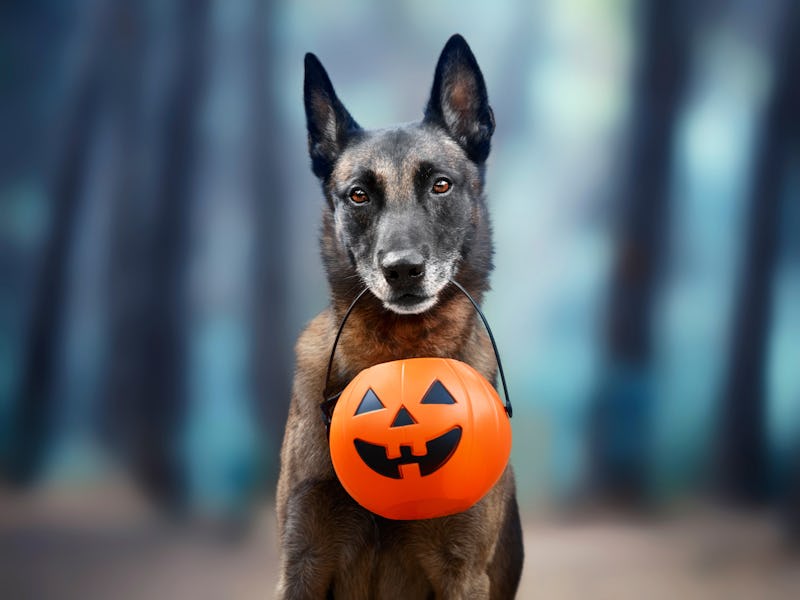Is Pumpkin Spice Dangerous To Dogs? Here’s Why They Should Avoid It
For dogs, pumpkin might be healthy, but pumpkin spice is not.

At long last, pumpkin spice season has returned. With a stunning array of treats to choose from, the next logical step after pumpkin-spicing absolutely everything for humans is to let our dogs share in the autumnal joy.
But people probably shouldn’t be quick to share their pumpkin spice latte or donut with their dog. In fact, it’s best to keep pumpkin spice-flavored goodies out of a pup’s reach. Here’s why/
Is pumpkin spice safe for dogs?
Pumpkin on its own is not toxic to dogs. In fact, a little pumpkin can do some good in some cases because it’s high in fiber. “If people are worried that their dog’s stool is a little firm or hard, or that they're constipated, we'll use it because of its nice, high fiber content to help soften stool,” Calico Schmidt, a veterinarian and clinical instructor at the University of Wisconsin-Madison School of Veterinary Medicine, tells Inverse. “So it can be nice and beneficial, and many dogs like it, which is a plus, too.”
That said, if a dog isn’t constipated, then pumpkin can lead to diarrhea.
Pumpkin spice, however, which doesn’t usually contain any pumpkin itself, isn’t as safe for dogs. Typically, the spice mix comprises a mixture of a sweetener, cinnamon, ginger, cloves, nutmeg, and allspice. Schmidt emphasizes that these spices can be toxic to dogs especially in higher amounts. However, the amounts found in food are generally not enough to pose a danger to our canine pets.
“Many of the things that are in spice combinations are not, in small amounts, toxic or harmful,” she says. It’s when dogs eat a loaf of pumpkin bread or get into a whole spice shaker that dangers arise. “If they were to get into, for example, a whole container of cinnamon or a whole container of pumpkin spice, they could ingest enough that we might see some problems” like diarrhea and vomiting, Schmidt says.
In particular, nutmeg can be a problem for dogs. It contains the toxin myristicin, which Schmidt says can cause neurological problems like disorientation and hallucinations. The Pet Poison Helpline adds that myristicin poisoning can also cause increased heart rate, high blood pressure, and possibly seizures.
Large amounts of cinnamon can also cause, in addition to an upset stomach, decreased blood sugar levels and irritation of the lungs. Big portions of ginger can also create problems. Schmidt adds that while some people might use small amounts of ginger to treat upset stomachs in dogs, large servings can make tummy problems worse and cause lethargy.
Even though a lick of this seasoning likely isn’t enough to cause big problems, Schmidt doesn’t recommend sharing a pumpkin-spiced treat with your furry friend. “I think that's a matter of how much is too much,” she says. Not only does the dose make the poison, but so does the dog’s size. A chihuahua’s tolerance level will differ from a larger dog’s. “A lot of times, toxicity is based on not only the concentration in the product, but also the size of the pet,” she says.
If your dog has eaten a considerable amount of pumpkin spice, or anything concerning, Schmidt recommends calling the Pet Poison Helpline. These experts can help determine a substance’s toxicity depending on how much was ingested.
Ultimately, your pet has no concept of seasonal trends, and won’t be able to appreciate pumpkin spice in the same way we humans do. Your dog will be just as happy with the same treats they eat year-round.